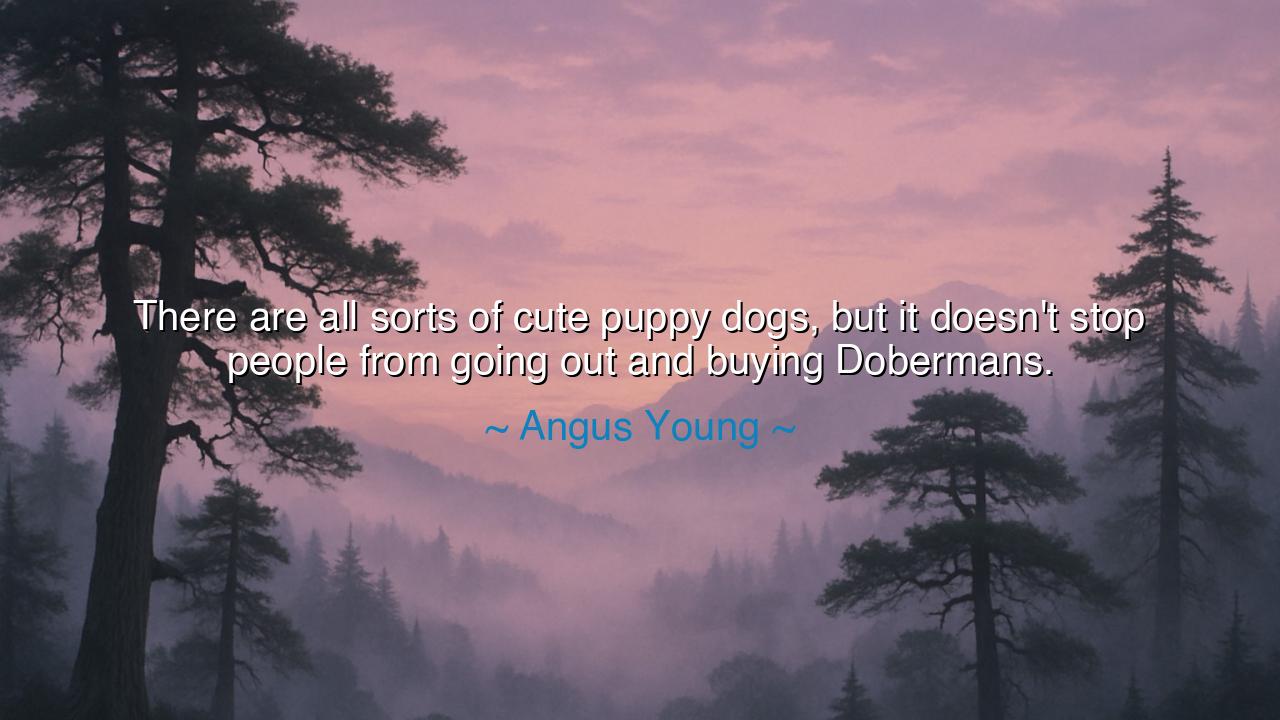
There are all sorts of cute puppy dogs, but it doesn't stop
There are all sorts of cute puppy dogs, but it doesn't stop people from going out and buying Dobermans.






Hear, O seekers of truth, the words of Angus Young, fierce minstrel of thunderous chords: “There are all sorts of cute puppy dogs, but it doesn’t stop people from going out and buying Dobermans.” At first it may seem but a jest, a playful turn of thought. Yet hidden within lies wisdom for the ages. For in these words is revealed the paradox of human desire: though gentleness is abundant, men are often drawn toward strength, though sweetness abounds, they still seek the fierce. The puppy dog is innocence, charm, and joy; the Doberman is power, protection, and danger. And man, ever restless, is pulled not only to what soothes, but also to what challenges.
This saying speaks of human choice, and the mystery of why men and women often desire what is not safest or simplest. The world is filled with comfort, yet hearts yearn for fire. A thousand soft companions may surround us, but still we crave the sharp edge of courage, the commanding presence of strength. Thus Angus Young, though speaking of dogs, speaks in truth of music, of art, of life itself. For just as some turn from the harmless to the formidable in choosing a dog, so too do audiences turn from the quiet song to the roaring anthem, from the gentle voice to the cry that shakes the earth.
Consider the tale of Rome. The empire had within its borders poets, philosophers, and artists who spoke softly of beauty and truth. Yet the people thronged not only to the orators of wisdom, but to the Colosseum, where gladiators clashed with blood and steel. They hungered not just for charm, but for power. The Doberman was chosen over the puppy dog, for it stirred something primal in the human spirit, a reminder of the will to endure, to conquer, to survive. And though this hunger was dangerous, it was real, and it shaped the destiny of empires.
So too in the realm of music itself. Gentle melodies have always been sung, lulling hearts to peace. Yet in the late twentieth century, when Angus Young thundered with AC/DC, the people did not flock merely to the tender ballad; they came to the electric roar, the hammer of rhythm, the fierce cry of rebellion. The puppy dog was beloved, but it was the Doberman that filled the arenas. Why? Because the human soul does not live only on softness—it craves the intensity that awakens it from slumber.
Yet let us not despise the puppy dogs, for they too hold their place in the balance of life. Joy, gentleness, and innocence are gifts as needed as courage and might. The wisdom of Young’s words is not to praise one over the other, but to acknowledge the strange duality of human longing: we desire both the comforting and the formidable. The heart that loves the soft kitten also admires the prowling lion. To deny this is to misunderstand the wholeness of the human soul.
The lesson, then, is clear: do not be surprised if the world sometimes chooses the fierce over the gentle. Know instead that both are needed. In your own life, embrace the puppy dogs—the moments of sweetness, peace, and laughter—but also do not shrink from the Dobermans—the trials, the challenges, the fiery passions that demand courage. For it is in the interplay of both that your spirit grows strong and your journey becomes full.
Practically, let each one who hears this teaching be mindful: do not settle only for what is easy, nor chase only what is fierce. Find harmony between gentleness and strength. In friendships, cherish those who soothe your soul, but also respect those who challenge you to rise higher. In work, enjoy moments of rest, but embrace the demanding tasks that sharpen your skills. In art, taste the beauty of the quiet song, but let your spirit also be shaken by the anthem that thunders.
Thus, children of tomorrow, carry this wisdom: the puppy dogs will warm your heart, but the Dobermans will test your courage. And in the balance of both, you will find the fullness of life. Do not fear the world’s strange desires, but learn from them, and shape your own path with both tenderness and power. For Angus Young’s jest was no jest at all—it was a revelation.
––






AAdministratorAdministrator
Welcome, honored guests. Please leave a comment, we will respond soon